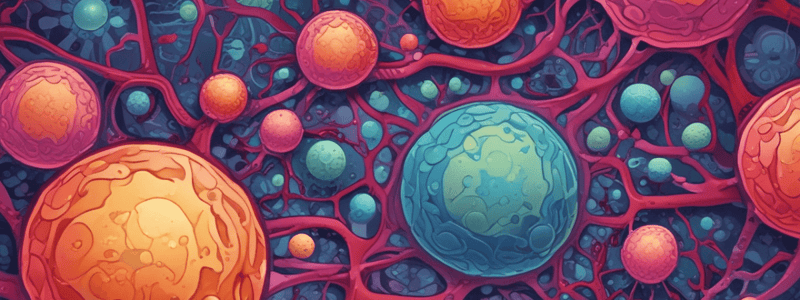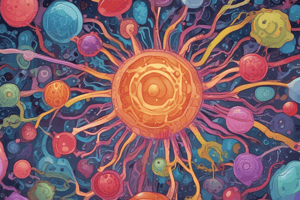Podcast
Questions and Answers
Which characteristic of adaptive immunity allows it to respond specifically to millions of antigens?
Which characteristic of adaptive immunity allows it to respond specifically to millions of antigens?
- Memory
- Diversity (correct)
- Specificity
- Self and non-self discrimination
What is the primary limitation of passive immunity?
What is the primary limitation of passive immunity?
- It provides lifelong immunity.
- It is short-lasting. (correct)
- It takes a long time to develop.
- It requires previous exposure to pathogens.
How does active immunity primarily differ from passive immunity?
How does active immunity primarily differ from passive immunity?
- Active immunity leads to immunologic memory. (correct)
- Active immunity provides antibodies without exposure to an antigen.
- Active immunity occurs naturally, while passive immunity is always artificially acquired.
- Active immunity is short-lasting.
Which form of immunity can be acquired through breast milk?
Which form of immunity can be acquired through breast milk?
What type of antibody is transmitted from mother to fetus through the placenta providing passive immunity?
What type of antibody is transmitted from mother to fetus through the placenta providing passive immunity?
Which characteristic of adaptive immunity allows it to distinguish between 'self' and 'non-self'?
Which characteristic of adaptive immunity allows it to distinguish between 'self' and 'non-self'?
Which molecule on Th cells interacts with B7 on antigen-presenting cells (APCs) for activation?
Which molecule on Th cells interacts with B7 on antigen-presenting cells (APCs) for activation?
What is the role of IL-1 secreted by macrophages and other APCs?
What is the role of IL-1 secreted by macrophages and other APCs?
Which statement correctly describes the first signal for the activation of Tc cells?
Which statement correctly describes the first signal for the activation of Tc cells?
What is the function of IL-2 in Tc cell activation?
What is the function of IL-2 in Tc cell activation?
Which type of cell-mediated immunity is associated with Tc cell activity?
Which type of cell-mediated immunity is associated with Tc cell activity?
Which cytokine is involved in activating macrophages and NK cells during Th cell differentiation?
Which cytokine is involved in activating macrophages and NK cells during Th cell differentiation?
What is the primary function of the humoral immune response?
What is the primary function of the humoral immune response?
Which cells are primarily involved in the process of opsonization?
Which cells are primarily involved in the process of opsonization?
Which type of immunity is responsible for resistance to tumors?
Which type of immunity is responsible for resistance to tumors?
Which of the following can be considered an antigen-presenting cell (APC)?
Which of the following can be considered an antigen-presenting cell (APC)?
What is the role of MHC class II molecules in the immune response?
What is the role of MHC class II molecules in the immune response?
What triggers the activation of Th cells?
What triggers the activation of Th cells?
Which of the following is NOT a condition where cell mediated immunity plays a role?
Which of the following is NOT a condition where cell mediated immunity plays a role?
Which molecules are involved in the first signal for specific B-cell activation?
Which molecules are involved in the first signal for specific B-cell activation?
What is the role of Tc cells in the cell mediated immune response?
What is the role of Tc cells in the cell mediated immune response?
What role do cytokines IL 2, 4, & 5 play in B-cell activation?
What role do cytokines IL 2, 4, & 5 play in B-cell activation?
What is the second signal required for T-dependent B-cell activation?
What is the second signal required for T-dependent B-cell activation?
What occurs during the contraction phase of the immune response?
What occurs during the contraction phase of the immune response?
Which cells regulate the response during the contraction phase?
Which cells regulate the response during the contraction phase?
Which cell types are primarily involved in innate immunity?
Which cell types are primarily involved in innate immunity?
What characteristic does adaptive immunity possess that innate immunity lacks?
What characteristic does adaptive immunity possess that innate immunity lacks?
What is a defining feature of superantigens?
What is a defining feature of superantigens?
Which of the following diseases are associated with superantigens?
Which of the following diseases are associated with superantigens?
What is the specificity target for innate immunity?
What is the specificity target for innate immunity?
Which characteristic is shared by both innate and adaptive immunity?
Which characteristic is shared by both innate and adaptive immunity?
What is the role of antigen-presenting cells (APCs) in the adaptive immune response?
What is the role of antigen-presenting cells (APCs) in the adaptive immune response?
How are cytotoxic T cells (Tc) activated?
How are cytotoxic T cells (Tc) activated?
Which cells differentiate into plasma cells in the adaptive immune response?
Which cells differentiate into plasma cells in the adaptive immune response?
What is the primary function of plasma cells?
What is the primary function of plasma cells?
Which cells are directly involved in killing infected cells?
Which cells are directly involved in killing infected cells?
What is the significance of memory cells in the adaptive immune response?
What is the significance of memory cells in the adaptive immune response?
Which statement correctly describes the processing of super antigens?
Which statement correctly describes the processing of super antigens?
To which region of the T-cell receptor (TCR) do super antigens bind?
To which region of the T-cell receptor (TCR) do super antigens bind?
What type of activation of T cells is caused by super antigens?
What type of activation of T cells is caused by super antigens?
What is a significant effect of cytokine release triggered by super antigens?
What is a significant effect of cytokine release triggered by super antigens?
Which characteristic differentiates a classic antigen from a super antigen regarding TCR region binding?
Which characteristic differentiates a classic antigen from a super antigen regarding TCR region binding?
Flashcards are hidden until you start studying
Study Notes
Characters of Adaptive Immunity
- Adaptive immunity discriminates between "self" and "non-self" structures.
- It is highly specific for the invading organism and can respond specifically to millions of antigens.
- Adaptive immunity requires previous exposure to pathogens.
- It has memory, meaning re-exposure to the same antigen results in a faster and stronger response, sometimes leading to lifelong immunity.
Types of Adaptive Immunity
Passive Immunity
- Involves the transfer of readymade antibodies to an individual.
- Provides rapid protection but is short-lasting.
- Can be naturally acquired (e.g., from mother to fetus through the placenta or in breast milk) or artificially acquired (e.g., through injection of specific antibodies).
Active Immunity
- Involves the individual's active production of their own antibodies or sensitized lymphocytes specific to a foreign antigen.
- Immunity develops slowly but lasts for a long time due to the development of immunologic memory.
Mechanisms of Adaptive Immune Response (Active Immunity)
Humoral (Antibody-Mediated) Immune Response (HI)
- Directed mainly towards defense against extracellular microbes and their toxins, leading to their extracellular elimination or destruction via different cells (e.g., phagocytes and NK cells).
Cell-Mediated Immune Response (CMI)
- Responsible for a wide variety of protective mechanisms, including:
- Resistance to viruses, protozoa, fungi, and intracellular bacteria (e.g., TB and Brucella).
- Resistance to tumors.
- However, CMI can also play a role in harmful conditions, such as:
- Graft rejections.
- Type IV hypersensitivity.
- Autoimmune diseases.
Stages of Specific CMI Immune Response
Antigen Processing and Presentation
- Antigen-presenting cells (APC) (e.g., macrophages) bind, ingest, and digest antigens into peptide fragments (Ag determinants or epitopes) and present them in association with MHC class II molecules on the cell surface to be recognized by TCR of Th cells.
T Cells Activation
- Th cells are activated in association with MHC and costimulatory molecules.
- Activated Th cells secrete cytokines (e.g., IFN-γ), which activate macrophages and NK cells, increasing their killing effects against antigens.
Activation of Tc Cells
- Tc cells are activated in association with expression of cytotoxins (e.g., graft cells, tumor cells).
Activation of Th Cells
- Th cells are activated by two signals:
- The first signal: Ag epitopes associated with MHC II on the surface of APC.
- The second signal: Costimulatory molecules (e.g., CD28 on Th cells and B7 on APC).
- Activated Th cells undergo proliferation and differentiation into effector cells, secreting cytokines (e.g., IFN-γ and IL-2) that activate macrophages and NK cells.
Activation of Tc Cells
- Tc cells are activated by two signals:
- The first signal: Ag epitopes associated with MHC I on the surface of target cells.
- The second signal: IL2 produced from activated Th cells.
- Activated Tc cells undergo proliferation and secrete cytotoxins to kill target cells (e.g., graft cells, tumor cells, infected cells).
Specific B Cells Activation (T-Dependent Activation)
- Specific B cells (acting as APC) are activated by two signals:
- The first signal: Interaction between TCR on Th and Ag epitopes associated with MHC II on the surface of B cells.
- The second signal: Costimulatory molecules (e.g., CD40 on B cells and CD40L on Th cells).
- Activated B cells differentiate into antibody-producing plasma cells and memory cells.
Contraction Phase (Homeostasis)
- Occurs when the effective immune response eliminates the microbe that initiates the response.
- In this stage, expanded lymphocyte clones die, and homeostasis is restored.
- This response is regulated by Treg cells.
Memory Cells Formation
- Some activated Th, Tc, and B cells become memory cells that can respond to exposure of the same antigen.
Superantigens (SAgs)
- Definition: Antigens capable of activating multiple clones of T helper cells.
- Characteristics:
- Bind to class II MHC molecules on APC and the TCR β chain on Th cells outside the peptide binding groove.
- Activate Th cells even at very low concentrations.
- Can cause lymphocyte exhaustion and systemic toxicity.
- Examples: Staphylococcal enterotoxins and toxic shock syndrome toxins, Streptococcal pyrogenic exotoxin, and some viral superantigens (e.g., nucleoprotein of rabies virus).
Studying That Suits You
Use AI to generate personalized quizzes and flashcards to suit your learning preferences.




